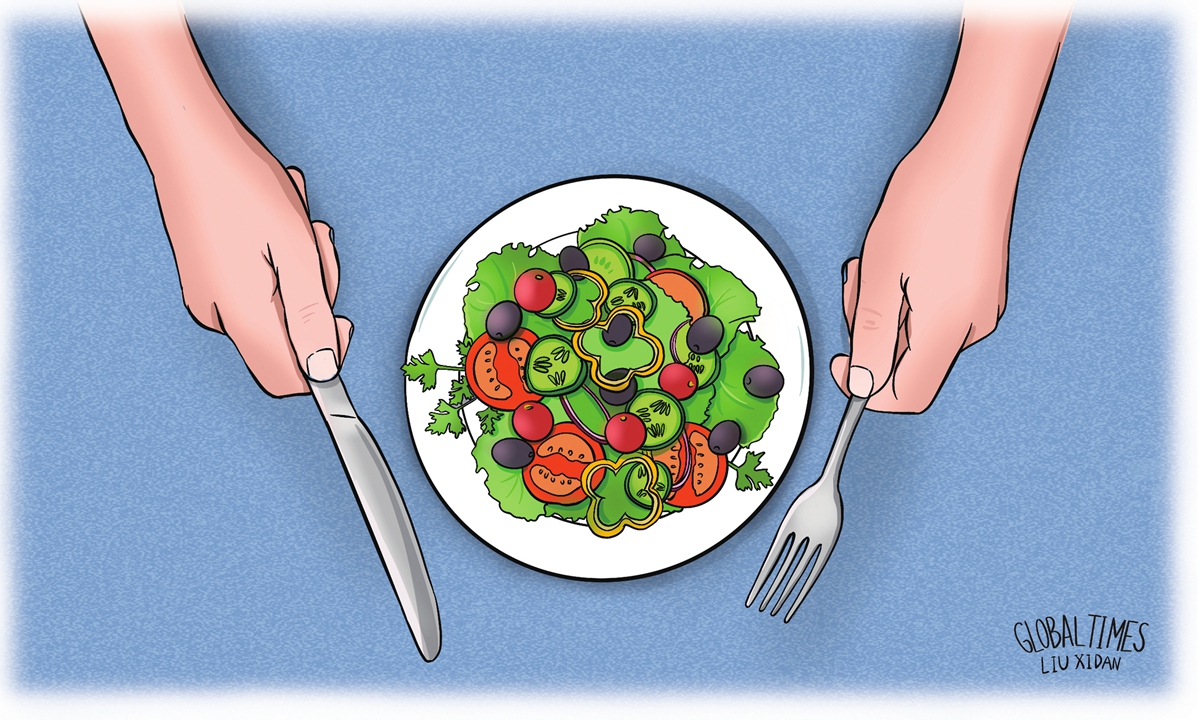
Illustration: Liu Xidan/Global Times
When dealing with global challenges such as the food crisis and climate change, Western elites should take the lead, rather than urging developing countries to tighten their belts in a bid to maintain their appetite for the extravagant spending of Western developed countries.
The Nature Food journal on Monday published a brief communication with the headline: "Adoption of plant-based diets across Europe can improve food resilience against the Russia-Ukraine conflict," completed by Sun Zhongxiao and Zhang Qian at China Agricultural University, as well as two experts from the Netherlands.
According to the article, when "crises related to extreme weather events, COVID-19 and the Russia-Ukraine conflict have revealed serious problems in global food (inter) dependency," a transition toward planetary health diet will help. It said "If the European Union and the United Kingdom reduced meat consumption 20 percent, the saved crops could replace most crops exported by Ukraine and Russia... If 50 percent of people engaged in a planetary diet shift, the saved crops would account for almost all crops exported by Ukraine and Russia (except wheat and sunflower) and would yield a considerable environmental dividend."
Yes, it is Europe's turn now! Forbes in 2021 pointed out that in recent years, Western rich countries have been putting pressure on the developing world to eat less meat. Time magazine in the same year posted an article entitled "How China could change the world by taking meat off the menu." In 2019, the Economist released an article entitled "The planet needs China to curb its appetite for meat."
The study by Nature Food once again demonstrates that tackling climate change and food crisis requires joint efforts from the whole world. Everyone can contribute to this by making dietary shifts where possible. However, Western developed countries cannot force developing countries to change their dietary structure, so as to continue their luxurious lifestyles, in the manner of moral kidnapping. This will result in the Matthew effect and a widening gap between the rich and poor countries.
If the West does regard climate change triggered by carbon emissions as a challenge that threatens the common destiny of mankind, everyone must bear corresponding responsibilities, including the adjustment of lifestyle. Playing tricks or scheme against others will backfire and divide global unity, said Shen Yi, a professor at Fudan University.
According to figures by the official website of the Organization for Economic Co-operation and Development (OECD) in 2021, Western developed countries' consumption in beef and port sharply outweighed that of developing countries. The middle and upper class in Western countries should take the lead in implementing the shifts of their diets, instead of weaponizing public opinion to force developing countries to change, while retaining their habitual lifestyles.
The West always likes to talk about the total amount of meat consumption in China, but the reality is that China is the world's largest country in terms of population. In terms of per capita consumption of meat products, many countries, especially Western countries, are far ahead of China.
Take pork consumption as an example. Pork accounts for the largest share of China's meat consumption. But according to data of the OECD, in 2021, China ranked behind Vietnam and South Korea in per capita consumption.
In addition, for beef consumption, the OECD shows that China's per capita beef consumption is even lower than the world average in 2021. The US' is more than six times that of China. Western countries such as Canada, New Zealand, Australia, and Switzerland also consume far more beef per capita than China. It can be seen that Western countries are the major consumers of beef.
Beef produces five times more heat-trapping gases than pork. Before the West asks China to improve its diet, shouldn't it first examine itself?
Eating more vegetables is indeed helpful to the environment, but the West cannot politicize the dietary structure. When talking about meat consumption, the Western media tends to pin labels against China. Such long-term public opinion hype will not be conducive to cooperation among countries to deal with climate changes.
What's more, it should be noted that the use of energy represents by far the largest source of greenhouse gas emissions. According to the data, in 2021, the energy use per person in the US was as high as 77,574 kWh, ranking first in the world.
When the West is dealing with climate change and food security, it cannot rob the poor to feed the rich, noted Shen.
The author is a reporter with the Global Times. opinion@globaltimes.com.cn




